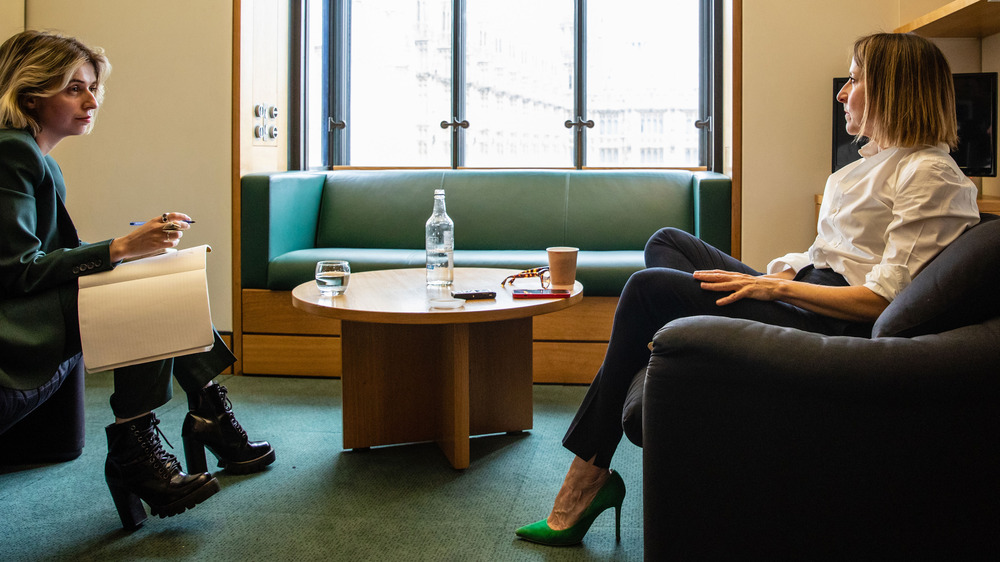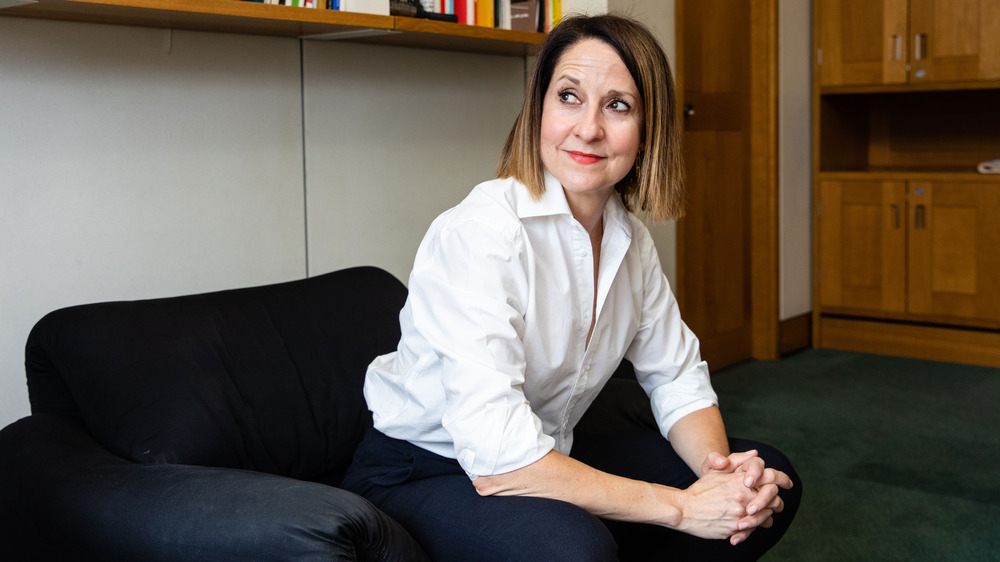The Liz Kendall interview: “I don’t want to go back to 1997, let alone 1945”
Shadow care minister Liz Kendall, photographed by Louise Haywood-Schiefer
11 min read
As shadow care minister, Liz Kendall has to come up with answers to an ageing society. She tells Tali Fraser about her mission to put social care on an equal footing with the NHS, why certain Conservatives have made her furious and what it’s like talking to your parents about death. Photography by Louise Haywood-Schiefer
Liz Kendall has been thinking about getting older. Having worked on health and social care policy for around 25 years, including as a special adviser in the last Labour government, she has been asking herself: “Why are we not making any progress?”
One of the answers, the shadow care minister says, is that “nobody wants to think about what it’s like getting really, really, really old”.
“They don’t want to think about what it’s like to lose their memories. They don’t want to think about, if you do go into a nursing home for people with severe levels of dementia, what that is really like. And nobody wants to think about death.”
It took Kendall, 52, a while to even broach the subject with her parents – and it was only prompted after discussing it with a friend who had cared for her own father at the end of his life.
“I thought to myself, ‘Oh my God, this is terrible. No, I haven’t spoken to my mum and dad.’ She said: ‘Believe you, me; you want to do it now.’”
At this point, Kendall gets emotional – breaking eye contact and looking away as tears form. “My good old mum was well up for the discussion. She wanted to talk about it – what she wanted, what she wanted for her funeral, or how she would like it to be. It was me who didn’t want to think about my mum dying,” Kendall confesses. “You don’t want to think about that.”
 Tali Fraser and Liz Kendall in her Westminster office
Tali Fraser and Liz Kendall in her Westminster office
The Leicester West MP is perhaps the biggest advocate of political good that I have ever met. At a time when the experience of being an MP can be pretty off-putting, she maintains that what we are discussing is the true meaning of politics – and it comes across with real conviction.
“This is politics; politics is life and death. Politics is what we’re all experiencing,” Kendall says. She felt much better having spoken to her parents, despite the conversion being trickier with her father.
“At least we’ve got that, so I won’t be in a sort of awful panic,” Kendall says. “Thank goodness for my friend! I suddenly started thinking, ‘Well, if I am not doing it and this is my job! C’mon Liz, get with the programme,’ but it is barely talked about here in this place [Westminster].”
The day we meet in her Westminster office is the 75th anniversary of the National Health Service and the shadow social care minister recognises that, were it founded in 2023, it would be a different being.
“If you were going to create the NHS today, you’d have a really different model. Because when the NHS was founded, life expectancy, I think, was 63 years old but now one in four babies born this year are set to live up to 100.
“Back then, the main disease burden and cause of death was infectious diseases and accidents; now it’s long-term, chronic conditions. And back then, if there were older or disabled relatives, women stayed at home and looked after them, and now we go out and work.”
Does Kendall find the deification of the NHS – the late Conservative chancellor Nigel Lawson famously asserted that it was the “closest thing the English people have to religion” – counterproductive to reform?
She doesn’t quite see it that way: “It’s like your family. You love your family but you can also see their faults.”
I don’t believe in reorganisations in the NHS. We’ve done millions of them, they never achieve what you want
Back in 2015, when she was standing in the Labour leadership contest, she said the Labour Party has “no God-given right to exist” – is it the same for the NHS?
“What I’ve really learnt, I suppose, in my many years in politics, is that no argument is ever won,” Kendall says.
“The NHS has to remake the argument for why its fundamental principles remain right for the future, but also why it itself has to change so it can meet the health conditions of today and tomorrow, just as the Labour Party has to be able to make an argument for working people as we are today, not from the past.”
She is a rare presence in Labour as someone with government experience, albeit as a special adviser, having worked for Harriet Harman, then shadow social security minister, and Patricia Hewitt, first at trade and industry, and then at health. Despite this, she is not a fan of returning to the past.
“I don’t want to go back to 1997, let alone 1945. I want to be the party of the late 2020s and beyond; that doesn’t mean changing your principles but it does mean setting out a vision for the future.”
With the pressure of an ageing population on its shoulders, the shadow care minister says the NHS “really is under the most pressure I’ve seen” but she is also optimistic – branding it both “its biggest challenge and biggest opportunity”.
The crux of one of those big challenges for the future is to put social care on an equal footing with the NHS.
“We have to wake up to the fact that we are an ageing society,” Kendall says.
That requires a shift towards prevention and early intervention and, according to Labour, the creation of a new National Care Service, delivered in partnership with local councils rather than a central body.
Is she taking note of Patricia Hewitt’s review of integrated care systems (ICSs)? After all, Hewitt was Kendall’s predecessor in the Leicester West constituency, and her former boss.
“Her main argument – which was that we need to shift the focus of services and support towards prevention and early intervention and join up those services; there is one person, there should be one service, one team – absolutely.”
Would she, then, unlike the current government, commit to Hewitt’s recommendation that the share of total NHS budgets at ICS level going towards prevention should be increased by at least one per cent over the next five years?
“Nice try. Nice try!” Kendall says. “I’m not avoiding the question. I actually believe we’ve got no idea what the economy is going to be like next month, let alone by the time of the election.”
Kendall continues: “I think the public are clearly miles cleverer than many people think. They know when they’re being told something that isn’t true or can’t be stuck to, and I think they’re sick of it. So I’m not going to make commitments on that. But is our [attention] on shifting the focus of service to prevention, as a principle? Absolutely it is.”
 Shadow care minister Liz Kendall in Westminster Hall
Shadow care minister Liz Kendall in Westminster Hall
There is an economic case for better social care, she says. Kendall refers to a “staggering” statistic that she believes does not get enough attention: one in five women aged 55-60 have caring responsibilities – and many are becoming economically inactive because of it.
“Women in their 50s are in the prime of their life!” the shadow care minister, a member of that group herself, exclaims with a chuckle.
“Yet, what many women are finding is, perhaps people who have had their children younger than me [Kendall had her first child via surrogate last year], their kids are off out the door but now they’re caring for an elderly relative.”
She adds: “They’re trying to patch it all up; they’re trying to hold down their job and for too many people, especially women, they have to give up.”
Labour is “right to be absolutely championing childcare”, the shadow care minister says, but adds “in the 21st century, which is the century of ageing, we have got to be as bothered about a decent social care system”.
Sir Andrew Dilnot, the architect of the Conservatives’ plan to cap social care costs, said the state of social care leaves older people “as though they’re standing in the middle of the road with a lorry driving towards them and the best they can hope for is that they die before the lorry hits them”.
“I completely agree with Andrew on that,” she says. “If you have ever known anybody who has ended up facing these catastrophic care costs, who sees their life’s savings, life’s work, wiped out because they are unlucky enough to have dementia: it’s unfair, it really is.”
One of the issues feeding into this is the huge number of staff vacancies because, as Kendall puts it, “the care system isn’t functioning”.
Women in their 50s are in the prime of their life!
The New Conservatives, a group of predominantly red wall Conservative backbench MPs, have said they would like to see the end of the care worker visa scheme to cut immigration numbers by more than 80,000. Is she surprised to hear ideas like this when there are staff shortages?
“Maybe they should focus more on paying our care workers a decent wage, giving them the training they want, getting rid of unwanted zero-hours contracts …
“You’ll forgive me if I’m slightly impatient with and, quite frankly, angry with people who criticise everybody else when the power is within their hands to make a difference in this country and they’ve utterly failed to do so.”
As she continues to talk, Kendall becomes so furious that she almost struggles to put her words together. “No, no, I don’t think it’s astonishing. It is everything I expect from certain Conservatives who will blame everybody else for their utter failings. I think it is … no, I’m not going to,” the shadow care minister says, composing herself.
“It reminds me because it’s Wimbledon [the tennis championships have just got under way when we meet], the truth is, most of us are better off trying to be Björn Borg-calm. Not John McEnroe: he was brilliant when he was angry. Björn Borg was better when he was calm. So I am going to channel Björn Borg now but believe you, me, I find it distasteful. They blame everybody but themselves and that’s probably the most diplomatic I can be.”
 Liz Kendall photographed by Louise Haywood-Schiefer
Liz Kendall photographed by Louise Haywood-Schiefer
Kendall has been campaigning for better rights for those in care homes, following the pandemic when some banned visitors: “There should be a right, that you have a right to see your loved one and that should be in all care settings. I’m completely clear on that.”
The government has so far launched a consultation on legislation that would give the Care Quality Commission (CQC) further powers to hold care homes to the required standard – current guidance from NHS England and the government says that health and care settings should be allowing visits – which the shadow care minister brands “a total wishy washy nonsense”.
“Einstein’s definition of madness is to keep doing the same thing over and over again and expect a different result,” Kendall adds. “It’s why I don’t believe in reorganisations in the NHS. We’ve done millions of them, they never achieve what you want. On this, saying, ‘Oh, we’ll consult and the CQC etc’; they’ve tried it, it’s failed. Give people the right. Try something new!”
Part of the reason she believes there needs to be stronger rights and regulatory powers is the number of care home residents facing abuse, with only one per cent of cases ending in charges.
The shadow care minister says she had a friend who, when her mother was in a care home, set up a Skype system which was constantly switched on to monitor the care given to her mum. “I know people don’t have trust in the system,” Kendall says, “and that needs to change.”
Should people be placing hidden cameras in their relatives’ care homes? “If I thought I needed a camera, I wouldn’t put them in the care home,” she retorts, quickly adding, “but maybe I wouldn’t have a choice”. Either way: “I do not think that is a sustainable solution.”
Kendall continues: “I’ll tell you what I find despicable: the way some companies who own the care homes where this abuse has happened get away scot-free. Take responsibility, not a massive bonus. It’s not right.”
The shadow care minister does not reveal what Labour would do to hold these companies to account, but adds that we can expect more on this in the future. “The current system isn’t right,” Kendall says. “To have a solution that you are spying is not right either. That’s not what our goal should be. Our goal should be confidence. Confidence in the staff, confidence in the management and confidence that the companies who own these care homes take responsibility and are accountable for their failures.”
Despite holding her policy cards close to her chest, Kendall is confident that Labour can be the party to do that.
